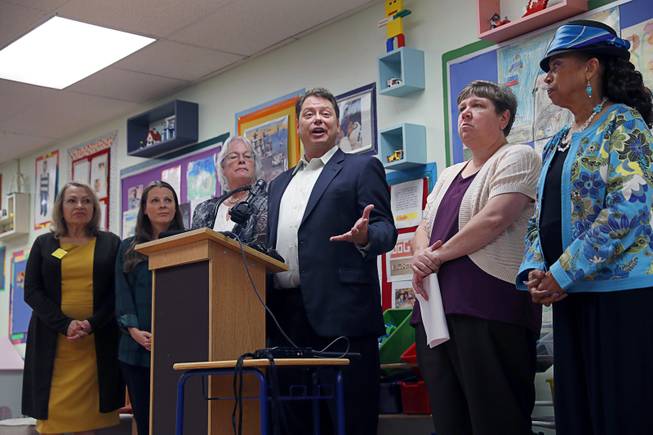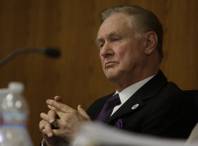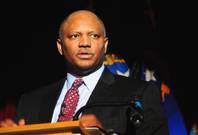
Pat Skorkowsky, center, superintendent of the Clark County School District, responds to a question after announcing his retirement, at the end of his contract in June 2018, during an event at Bracken Elementary School Thursday , Sept. 7, 2017.
Monday, Sept. 25, 2017 | 2 a.m.
If leading the country’s fifth-largest school district isn’t daunting enough, try doing so in the midst of a massive reorganization, a budget deficit of at least $60 million and a continual firestorm of pushback from unions and trustees.
That’s the reality retiring Clark County School District Superintendent Pat Skorkowsky will face during his last 10 months before calling it quits in June. Perhaps more importantly, it’s what his successor likely will inherit.
For an annual salary near $265,000 and a benefits package boosting that value to about $375,000, leading CCSD’s 322,000 students and 16,000 teachers isn’t a task for the thin-skinned or impatient, said Kim Metcalf, dean of UNLV’s School of Education. The historically high district deficit and tensions between some of its most powerful leaders won’t make it any easier.
“It’s always complicated in a large, diverse urban district,” Metcalf said. “But this is a more delicate search than most superintendent searches, even here, would be.”
Skorkowsky, who has headed the district since 2013, announced his 2018 retirement Sept. 7. Over the past year, he has faced immense pressure to resign from union leaders, including the Clark County Education Association’s John Vellardita and the Clark County Association of School Administrators and Professional-Technical Employees’ Stephen Augspurger, as well as from school board trustees Kevin Child and Chris Garvey.
The district’s biggest moves in Skorkowsky’s past 18 months at the helm included the approval of a $135.5 million expenditure to raise teachers’ minimum base salaries, and the passing into law of Assembly Bill 465, requiring a transfer of decision-making and budget-spending powers from CCSD’s school board to principals and schools over the next two years.
The departing superintendent’s critics argue that his approval of last year’s expenditure played a large role in creating the current budget crisis. Yet they’re also upset that Skorkowsky is managing that crisis by freezing teacher salaries.
“He directly negotiated that amount with teachers,” said Augspurger, executive director of the union representing Clark County school administrators. “If he couldn’t afford that amount, he shouldn’t have agreed to it.”
Reducing the deficit and implementing such a radical reorganization are tall tasks, Metcalf said. Skorkowsky has acknowledged as much. In announcing his retirement, he pledged to “be candid with our community” and “make tough decisions” while he remains in the position.
But if CCSD hiring trends over the past 35 years hold true, the next superintendent will be hired from out of state. Since bringing in Robert Wentz from the St. Louis public school district in 1982, CCSD has alternated for all five hires between in-house candidates and out-of-state education officials, based on various Las Vegas news reports.
Metcalf and Nevada Superintendent of Public Instruction Steve Canavero agreed with Skorkowsky’s retirement-speech assessment that the district should launch a national search for his successor. But candidates equipped to navigate the district’s two biggest challenges are few and far between, Canavero said.
“You’re looking at a narrow group of candidates with the capacity and skill set to run a district of this size and under these circumstances,” he said. “I would imagine less than 10 people nationally.”
The state superintendent suggested that CCSD should look beyond the education sector for its next leader — a practice increasingly common with school districts of CCSD’s size. On Jan. 2, Puerto Rico’s Department of Education hired businesswoman Julia Keleher as its superintendent to manage a budget crisis. Canavero said someone with a nonacademic professional background, like business management or systems development, would be a “smart possibility” for the CCSD position.
“Personally, I think the reorganization is a draw for systems leaders that would be engaged with the notion of school-based empowerment and transitioning from central office to central service,” he said. “I think that challenge would bring about people rather than dissuading them.”
In-house CCSD superintendent candidates would be more aware of the district’s history, its past mistakes and how to deal with the current landscape of tensions between the superintendent’s office, school board and local unions, Metcalf said. But those candidates might lack new ideas the district needs to power through the reorganization, and would be more prone to get tangled up in the same gridlock that has characterized the last years of Skorkowsky’s tenure.
On the flip side, external candidates would be more likely to have fresh ideas and the patience of those working around them, Metcalf said. But by not knowing the district’s history, such candidates might end up repeating mistakes.
“There’s always a history that has got an organization to where it is, and if you don’t understand the nuances associated with that, it becomes possible to repeat previous failures,” Metcalf said. “I don’t know if there’s a right or a wrong to this.”
Timeline of superintendents
The Clark County School District will soon launch a search for its 13th superintendent, who’ll begin after Pat Skorkowsky’s retirement in June. Here’s a list of those who’ve held the position since 2000.
• Carlos A. Garcia, 2000-05: Hired away from his position as Fresno Unified School District superintendent, Garcia had spent his entire teaching and administrative career in California before taking the reins at CCSD. Highlights of his tenure included fighting for higher teacher pay and per-pupil funding, and calling on the state Legislature to allot more money for public schools. But Garcia’s tenure also was characterized by an inability to improve test scores or shrink class sizes. Some middle and high schools in the district averaged as many as 35 to 40 students per class.
• Walt Rulffes and Agustin Orci, 2005-06: Rulffes, CCSD’s chief financial officer, and Orci, the deputy superintendent of instruction, oversaw the district for an eight-month interim period while officials conducted a national search for Garcia’s replacement.

Clark County Schools Superintendent Walt Rulffes attends Thursday's board meeting. He announced he will retire in August when his contract expires.
• Walt Rulffes, 2006-10: Rulffes was promoted from within after Orci and New York City education official Eric Nadelstern withdrew their names from consideration (just days before Nadelstern would have started the job he was rumored to have). Rulffes was one of four semifinalists for a national superintendent of the year award in 2010, but ultimately left against the backdrop of a soaring population of at-risk students, increased demand for academic progress by the federal government and an economy that had forced more than $250 million in district budget cuts.

Clark County Schools Superintendent Dwight Jones delivers his second annual "State of the District" address on Monday, Jan. 14, 2013, at Western High School. Jones unveiled a new online "Open Book" portal, which makes the district's financial information public, and touted the district's academic gains last school year.
• Dwight D. Jones, 2010-13: The former education commissioner of Colorado left that post to become CCSD’s second black superintendent. He also had worked as an assistant superintendent in Wichita, Kan. During his time leading CCSD, Jones faced pushback from the teachers union after announcing a freeze on employee salaries to deal with a massive budget crisis. When the pay freeze was overruled by an arbitrator, Jones was forced to cut more than 1,000 teaching positions. Droves of teachers also began leaving the district by choice. His successes included making district finances more transparent and developing a school-ranking system that offered greater autonomy to high-performing schools and more support to lower-performing schools.
• Pat Skorkowsky, 2013-present: Skorkowsky began his 29-year career in CCSD as a first-grade teacher at C.C. Ronnow Elementary School before working his way up to assistant principal, principal, academic manager and then deputy superintendent before taking on the top role. The high school graduation rate has improved to 82.5 percent, compared with just over 61 percent when he started. But spending under Skorkowsky, including the $135.5 million package to raise employee salaries, resulted in a budget deficit of at least $60 million entering his final 10 months on the job.

Join the Discussion:
Check this out for a full explanation of our conversion to the LiveFyre commenting system and instructions on how to sign up for an account.
Full comments policy